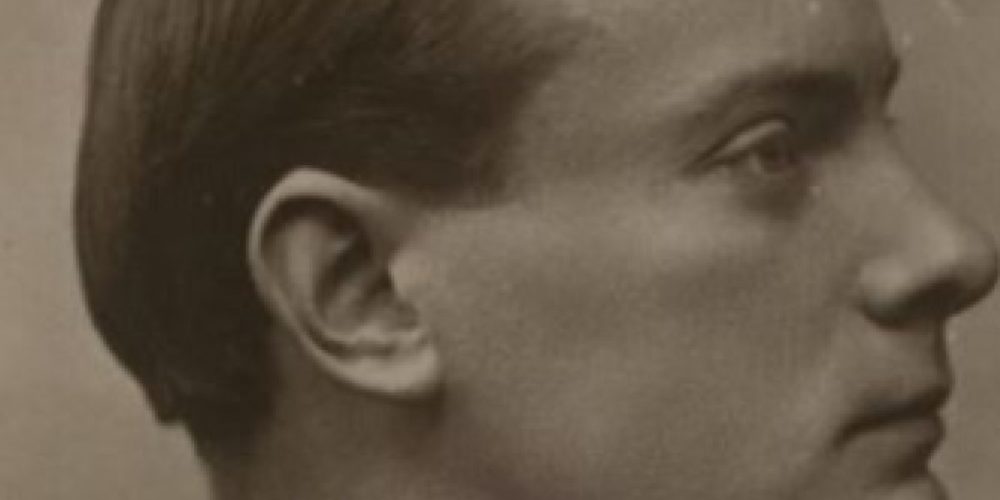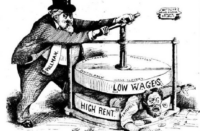Thanks to the current pandemic, Ireland was unable to publicly remember the Easter Rising of 1916, its aspirations for an independent socialist republic, its heroic leaders. Many of these leaders were poets and writers. Patrick Pearse’s poem “The Wayfarer” was written on the eve of his execution, in Kilmainham Gaol.
The beauty of the world hath made me sad, This beauty that will pass; Sometimes my heart hath shaken with great joy To see a leaping squirrel in a tree, Or a red lady-bird upon a stalk, Or little rabbits in a field at evening, Lit by a slanting sun, Or some green hill where shadows drifted by Some quiet hill where mountainy man hath sown And soon would reap; near to the gate of Heaven; Or children with bare feet upon the sands Of some ebbed sea, or playing on the streets Of little towns in Connacht, Things young and happy. And then my heart hath told me: These will pass, Will pass and change, will die and be no more, Things bright and green, things young and happy; And I have gone upon my way Sorrowful.
A wayfarer is a wanderer across the countryside, akin to a vagabond. It suggests that Pearse views his short life as a time spent wandering, perhaps restless, an observer of life. The fact that he knows he is facing the end of his life, that the world’s beauty “will pass,”has made him sad. Explaining this sadness, he states that this beauty has at times been so overwhelming that “my heart hath shaken with great joy.” This physical image, combined with the emotion it describes, is very moving.
The beauty Pearse recalls that has shaken his heart is that of the Irish countryside and people. He evokes this for readers in very vivid and varied images. There is fantastic movement in the “leaping squirrel in a tree” in the mid-distance, to the close-up of “a red lady-bird upon a stalk,” adding a beautiful red touch to the green vegetation. The view pans out further away as the day progresses to evening and evokes “little rabbits in a field,” which is lit “by a slanting sun.” The run-on line extends that gloaming.
Next the eye moves up to take in the solidity of a “green hill,” which is not still but has clouds trailing over it: “shadows drifted by.” In this image of a “quiet hill where mountainy man hath sown | And soon would reap,” nature and humankind merge in the purposeful activity of “mountainy man,” as present and future blend in “sown | And soon would reap”. Again, movement and process are enacted in a run-on line. It is a ripening Pearse will not live to see.
Perhaps the anticipated reaping on the hilltop “near to the gate of Heaven” allowed for some consolation for Pearse. On a more metaphorical level, this sowing and reaping (in the future) also refers to the Rising and that in future there will be a reaping.
Next there is a movement from adult to children, again suggesting the future. The image is very vivid and tactile: readers can see the children but also feel the sand under their bare feet. The fact that the children are barefoot underlines their connectedness to nature. The highly visual “ebbed sea” contains both the present and the future, as the ripples on the wet sand speak of the tide having gone out and turning again. The ebb and tide suggest the everlasting renewal of life and beauty.
In the middle of the line the image changes away from the seascape to “the streets | Of little towns in Connacht.” Both the sea and the town images expand by enjambment and suggest continuity, perpetuity. Pearse ends these images from the nature and people of Ireland with “Things young and happy.”
The concluding six lines reflect on this evocation of Ireland as a happy and beautiful place and return to the emotion of the poem’s first line, “sad.” Pearse’s heart has told him that all this beauty will “pass and change, will die and be no more.” The images of the poem, however, tell the reader that while this is true of individual life there is continuity that outlives individuals.
However, Pearse will not be a part of this natural cycle: he will be “gone upon my way.” Pearse poignantly speaks of himself in the past tense at this point, just before he ends the poem on its shortest line—ending his life prematurely on the solitary word “Sorrowful.”
The movement we felt in the run-on lines describing vividly the beauty and people of Ireland is over; the line is cut short, as Pearse’s life was. He was executed the following day, aged thirty-six.






